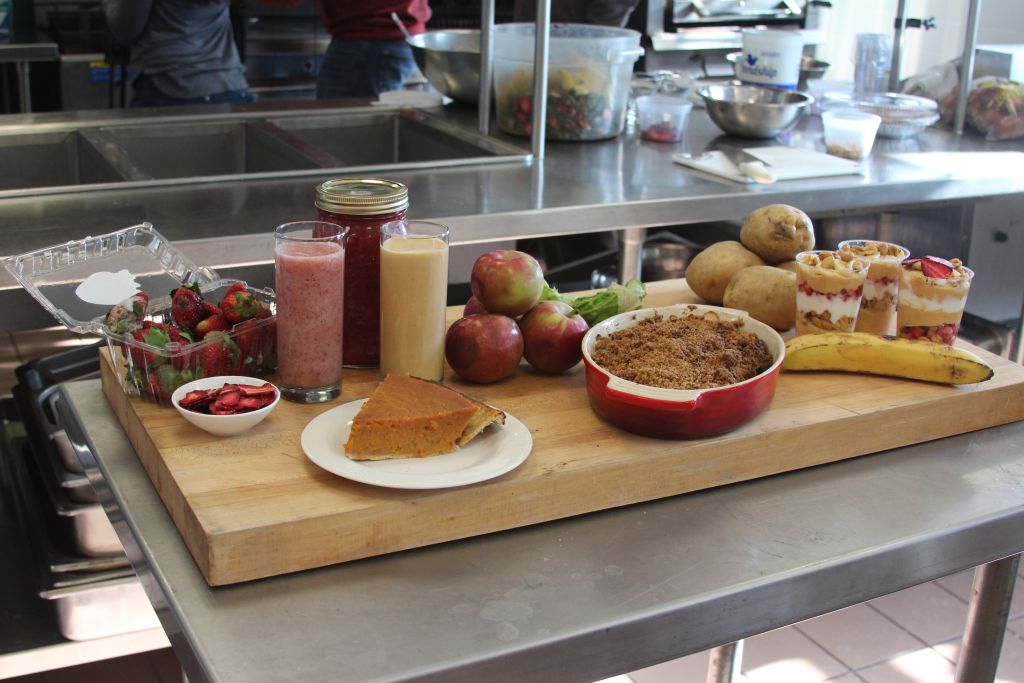
Food waste is the third largest greenhouse gas emission. Dr. Cathy Yungmann as well as Dr. Tom O’Donnell advised and guided students through interviews with services in Philadelphia and Chester working to eliminate this.
Senior students Greg Smith, Lauren Hight, Nick Cipollone and Amber Marshall presented on the issue. These four students spent the past months diving into the issues to create media for a documentary. The importance of this presentation is to get audiences to understand that just because food isn’t perfect does not mean that it doesn’t contain nutritional value. Preserving food is important and can help a lot of people. For example, if an apple is bruised it should not be thrown away. It can be used for something such as apple sauce or jam instead.
Tom O’Donnell set up many contacts for this project. O’Donnell’s anticipates getting this study exposed nationally. “Our hope is to take this content they are putting together and try to develop a new methodology teaching people about this very important issue,” O’Donnell said.
Greg Smith presented a segment clip of Brown Shop Right manager Tim Nolf. Brown Shop Right operates a little differently than most grocery stores . They try to only order what they need and separate the foods into categories for sale or donation based on the quality of the produce. In an average month they can donate in produce alone over 6,000 pounds.
. They try to only order what they need and separate the foods into categories for sale or donation based on the quality of the produce. In an average month they can donate in produce alone over 6,000 pounds.
Nolf has been in the grocery business for 24 years and has seen the amount of food wasted. “It really stops and makes you think, what a shame,” Nolf said. “All this food that is thrown away can’t be processed to people who are hungry, homeless or can’t be given to people who may need help with their groceries,” he added.
Lauren Hight discussed the second process of Brown Shop Right. “All the products that Brown Shop Right chooses not to keep goes to Drexel University’s culinary program,” Hight said.
Hight showed a clip of Drexel culinary students and the recipes they use to find new ways to use the produce although it is blemished. Drexel’s program is efficient in making sure surplus food is used for its nutritional value.
is efficient in making sure surplus food is used for its nutritional value.
Nick Cipollone talked about the business plan these companies make so they can make profit off of these surplus foods. “Basically with second chance food it is going to cut their product cost which will enable them to make more at cheaper rate,” Cipollone said.
Lastly, Amber Marshall talked about the last step of the surplus food challenge. She talked about City Team, a shelter in Chester that cooks all their food from donations.
“Serving three hot meals a day, 365 days a year they cook for many people providing them nutrients to thrive and work,” Marshall said.
After all the clips were shown there was a discussion held about options that Cabrini could take as a campus to eliminate our personal food waste.
Students, faculty and staff all spoke up and said how they felt about the situation and what Cabrini could do to change this.
“Penn State has a food bin on every floor of every building. So there is a bin for trash, plastic, paper and food. They conquest every piece of food scrap on campus,” Yungmann said.
Professor Fitzgerald spoke about his experience in boot camp. “There was a sign that read take what you want, but eat what you take. So in other words, just don’t take food for the sake of taking food.”
Although there was no official plan set in motion for Cabrini, Friday, Feb. 20 the campus will be hosting its first ever food drive.


